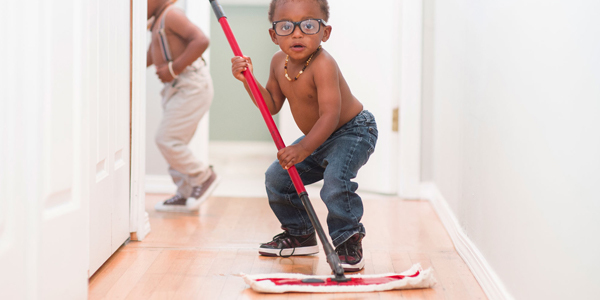 Frank Mckenna/Unsplash
Frank Mckenna/Unsplash
If you are interested in gender equality this is a depressing conversation:
Jancee Dunn Wrote a Book Called “How Not to Hate Your Husband After Kids” and We (Heleo) Made Her Talk to Her Husband About It.
A brief backstory; Dunn and her husband, Tom Vanderbilt, were living a life of domestic equality until their baby “shot out” and “these very traditional gender roles just came out of nowhere.”
 Jancee Dunn puts her husband on the spot.
Jancee Dunn puts her husband on the spot.
As they tell it, Vanderbilt stopped being the primary chef. He took up road cycling, which consumed several hours every Saturday, and played online chess in the evenings. He was more likely to enter the kitchen in search of a glass of wine than dishwasher to empty. Dunn noticed that a lot of moms shared her anger about husbands being so “blithely unhelpful” after having kids, so she wrote a book about it.
I remember studying The Second Shift, Arlie Hochschild’s seminal work on the division of domestic labor, at university in the early 1990s. Hochschild found that working women still take care of most of the household and childcare responsibilities. As evidenced by Dunn’s book, things have not changed much in the intervening 25 years. That is DEPRESSING.
This issue is about men. The solution is quite simple; Men need to do their share of housework. It is easily quantifiable and its much easier to open the dishwasher than it is to open up emotionally. Towards the end of the interview Dunn and Vanderbilt briefly discuss their resolution of the issue, but the title of her book misses the point; the solution, to this problem lies with men.
It is not a woman’s job to stop hating the fact she is doing the lion’s share of the housework. Dunn goes through all sorts of emotional hoops; confessing to martyr tendencies, reframing her perception of Vanderbilt’s behavior and admitting fault for not having relinquished control to her very capable husband. That’s all well and good, but much of it would have been completely unnecessary if her husband had done some work around the house.
How can we reach a point where men pull their weight?
First, let’s acknowledge that housework is tedious. If doing laundry, washing dishes, cleaning toilets and changing diapers was fun and fulfilling work, we wouldn’t have feminism. We can’t blame men for not wanting to do it, but all these things are necessary to a functioning household, so someone has to do it.
This morning my son scrambled himself some eggs. During the subsequent discussion about cleaning up afterward his tween angst exploded, “This is STUPID!”
To which I rolled out my familiar retort, “Yeah, it sucks, but its got to be done, so get on with it.”
Which brings up the second point; it is necessary to teach boys how to do housework. My wife reports conversations with her working mom colleagues who lament that their husbands are useless around the house. Serving cheerios for dinner or washing brand new jeans with white shirts. Nobody wants to be incompetent, but as evidenced by my son attacking the egg pan with a sponge, boys don’t acquire these skills by osmosis. Credit to my mother more teaching me to do housework, apparently a number of mother’s do everything for their sons.
An added benefit of educating boys about the domestic sphere is it puts housework on their radar. Translating that awareness into action is a harder battle. My father was a great role model. When my mother started a business in the late 80s, he began to cook and clean. I don’t know if the chores where equally apportioned, but he did a lot more that most of his peers. Today, I’m a stay-at-home dad. I do most of the work around the house, which is a different dynamic to the one we are discussing here. Having progressive parents certainly made it easier for me to follow my current path.
Dunn and Vanderbilt’s solution is to have regular family meetings to dole out the workload.
“Expert after expert said, “Sit down and have a family meeting,” which is not that fun, but they [all] would say, “You have to very clearly parcel this out because the arguments arise from ambiguity.”
Jancee Dunn
Setting boundaries and expectations is great. Tracking progress is also important. I have a chore chart on which we track whose turn it is to empty the dishwasher. That works for my kids. It can work for you and your spouse.
My suspicion is that some couples will go through all of the above and the men will still shirk their responsibilities. As many people have found traditional gender roles are quite resilient. I’ll admit I can be a domestic delinquent at times (There’s a future column.) If we are going to move beyond traditional roles, then putting the focus on the next generation of husbands might be more productive, hence my attention to setting an example for boys.
To my fellow dads, from a man whose primary role is the Second Shift, do more around the house. When a working dad like Tom Vanderbilt writes a book titled “How Not to Make Your Wife Hate You After Kids” we will be getting somewhere.
Advertisements Like this:Like Loading...





